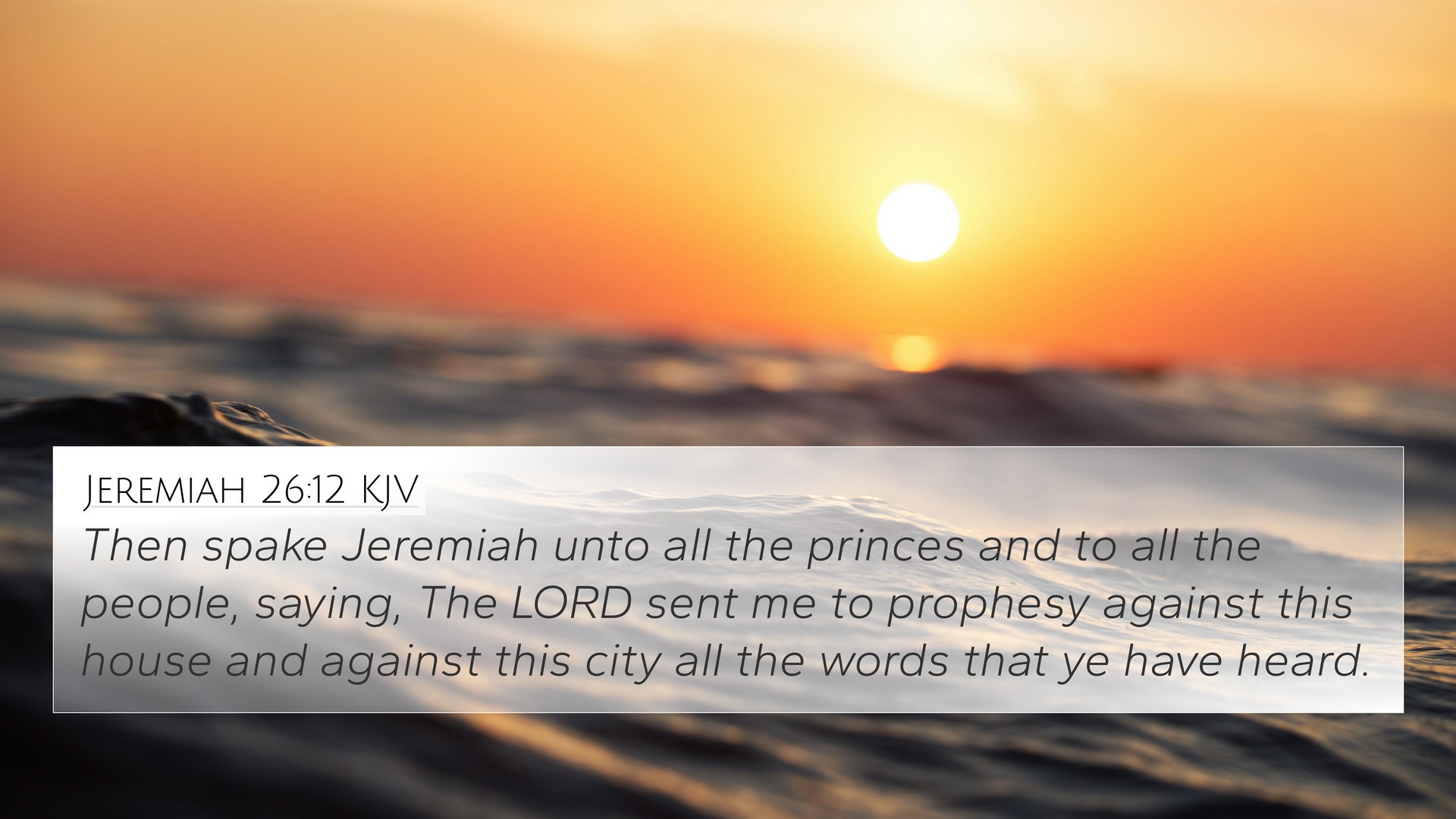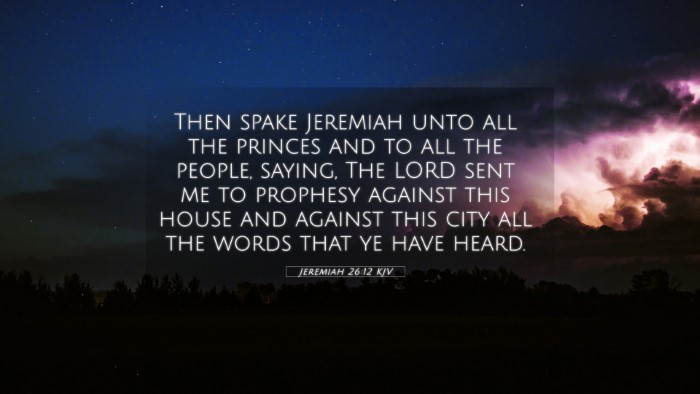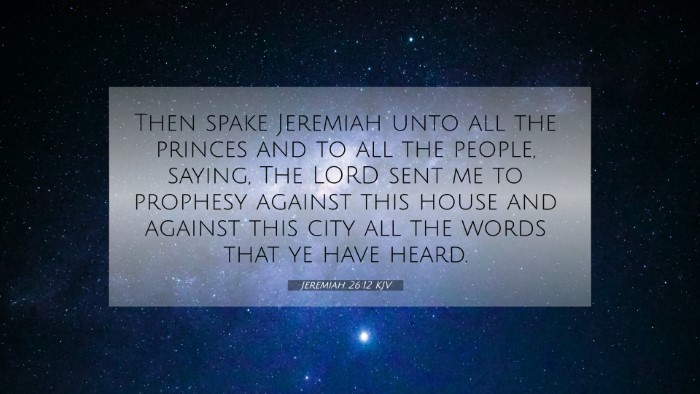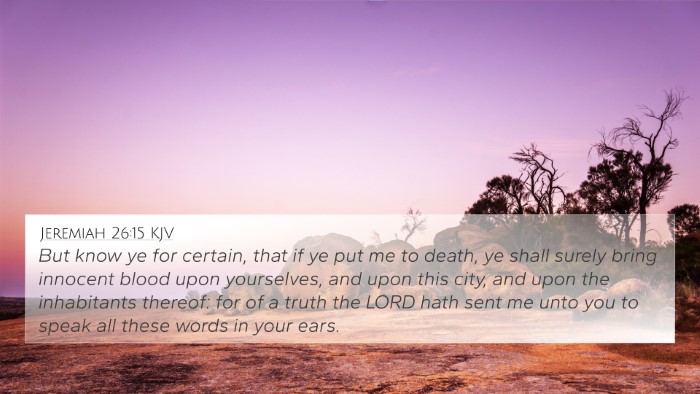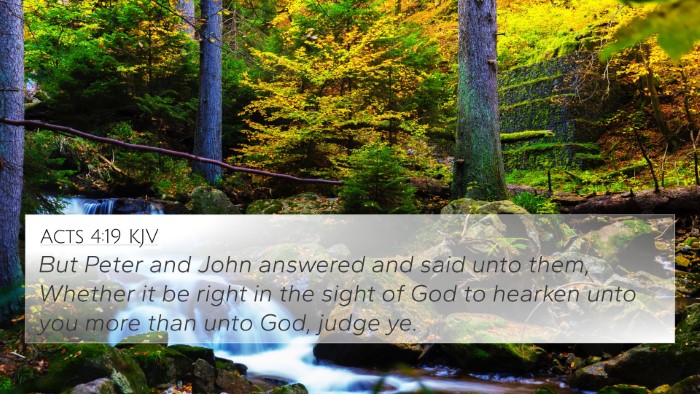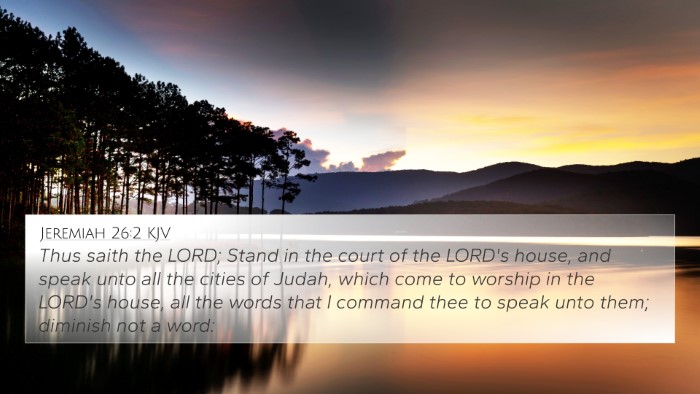Understanding Jeremiah 26:12
Jeremiah 26:12 reads: "Then spoke Jeremiah unto all the princes and to all the people, saying, The Lord sent me to prophesy against this house and against this city all the words that ye have heard." In this verse, the prophet Jeremiah declares the divine origin of his message to the leaders and citizens of Jerusalem.
Summary and Insights
This passage emphasizes the prophetic mandate given to Jeremiah by God. His role is not merely one of personal opinion but rather a vessel for the Lord's message concerning impending judgment. Various commentaries shed light on this critical moment in Jeremiah's ministry.
Insights from Matthew Henry
Matthew Henry emphasizes the importance of Jeremiah's prophetic role, illustrating that he is fulfilling God's directive to warn the people and their leaders of the consequences of their actions. His boldness to confront the princes illustrates the seriousness of his calling.
Insights from Albert Barnes
Albert Barnes points out that Jeremiah’s message was rooted in the prophets before him, suggesting a continuity in God’s warning to His people. He highlights the significance of Jerusalem as the focal point of divine revelation and judgment, noting that the city itself is emblematic of Israel's neglect of God’s commandments.
Insights from Adam Clarke
Adam Clarke provides further depth by exploring the historical and cultural context of Jeremiah's message. He places Jeremiah's prophetic utterance within the framework of covenant theology, indicating the dire need for the people to return to faithfulness to avert disaster.
Contextual Analysis
Understanding Jeremiah 26:12 requires recognizing it as part of a broader narrative where the prophet confronts the spiritual and moral decline of Jerusalem. It reflects a theme found throughout scripture of God's persistent call for repentance and faithfulness.
Related Bible Verses
- Jeremiah 1:7-9 - God’s commissioning of Jeremiah to be His prophet and speak His words.
- Jeremiah 7:25-26 - God’s long history of sending prophets to Israel.
- Ezekiel 3:17 - The responsibility of a prophet to warn the people.
- Isaiah 55:11 - The assurance that God's word will accomplish its purpose.
- 2 Chronicles 36:15-16 - The rejection of God's messengers by the people and the subsequent consequences.
- Matthew 23:37 - Jesus lamenting over Jerusalem and its rejection of God’s prophets.
- Acts 7:51-53 - Stephen speaking about the pattern of rejecting prophets in Israel's history.
- Hebrews 1:1-2 - God speaking through prophets previously and His ultimate voice in His Son.
- Luke 11:49 - Jesus acknowledging the sending of prophets to speak to the people of Israel.
- Romans 10:14-15 - The necessity of preachers sent to proclaim the gospel.
Cross-Referencing Insights
Jeremiah 26:12 serves as a poignant reminder of the necessity of accountability among God’s people. By tracing connections between this verse and others, we can see a thematic thread of prophetic warning throughout scripture.
Tools for Bible Cross-Referencing
To delve deeper into the cross-references associated with Jeremiah 26:12, one might utilize tools such as a Bible concordance, which can offer a comprehensive guide for identifying related scriptures. These resources enhance understanding by illustrating the interconnectedness of biblical texts.
Call to Action
For those engaged in Bible cross-reference study, exploring the links between various verses can illuminate themes of justice, mercy, and redemption found throughout the Scriptures. Looking at Jeremiah 26:12 in light of other passages will enrich your understanding of God's continuous call for repentance and faithfulness.
Conclusion
Jeremiah 26:12 encapsulates the vital role of a prophet in delivering God's message to His people. Through biblical cross-referencing, one can uncover the deeper connections within the scriptures, enhancing one’s spiritual journey and understanding of God's interactions with humanity.
